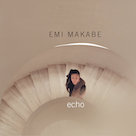

Emi Makabe: Echo
Sunnyside Records
An event permeating Emi Makabe's second album is the passing of her father, who died in 2021 at a hospital during the pandemic. The Brooklyn-based composer, singer, and shamisen and flute player chose Echo as the album title not only for its customary association with resonance but for its connection to the Japanese word eko, which refers to the act of praying for people who have died. With much of its material constellating around that profound life event and informed by it, Echo is a reverential musical statement dedicated to her father; in deeply grappling with his absence, it's also an act of catharsis for its creator. With the lyrics and music of all ten pieces written by Makabe, the collection is as personalized as a recording could possibly be.
Co-producer Jason Moran contributes piano to one track, Bill Frisell adds acoustic guitar to another, and Meshell Ndegeocello takes two MC turns, but Echo is primarily a quartet affair that augments Makabe with double bassist Thomas Morgan, drummer Kenny Wollesen, and Vitor Gonçalves on piano, accordion, and Wurlitzer electric piano. Her partners show themselves to be wholly sympathetic to her vision and supportive of the concept she has for each piece. The comfort level the four share on the new set was likewise in place on her 2020 debut, Anniversary, also featuring Morgan, Gonçalves, and Wollesen. Echo presents a cohesive identity whilst at the same time adventurously exploring a number of different moods and styles. There are instrumentals and vocal ballads, all neatly packaged and concisely presented.
Each track offers something different. The first surprise comes with “The Birthday Song,” whose folk-country ballad style, graced by Frisell's eloquent shadings and Makabe's loss-filled lyrics, tugs at the heartstrings. With Morgan and Wollesen tastefully supporting, she reflects movingly on life's cycles, her father's sudden passing (“I'll never forget that moment / When I came to know how fast the end comes”), and the warmth of his embrace. Explosive by comparison is “Morisan,” which resists easy categorization in its frothy blend of jazz, zydeco, and traditional Japanese music. Weaving accordion and shamisen into its pulsing groove makes for a distinctive sound, and Moran's high-energy piano solo's a nice touch. The combination of Makabe's vocal and flute distinguishes the moody “Mu” (a Japanese word meaning nothingness and nonexistence), which more generally considers the pain that comes with life experience; the intimate jazz ballad “Dignity,” on the other hand, addresses it directly in words she sings to her late father (“I miss you so much / We will never return to those days”).
Ndegeocello's reading of Makabe's impressionistic poem adds much to “Snow,” which arrests also for its shamisen, skittering groove, and the leader's wordless vocal. Ndegeocello's presence is as powerful on the title track, which again is elevated by an arrangement featuring shamisen and Makabe's gentle voice. Sung in Japanese, “Letter” nicely couples her singing with Wurlitzer electric piano, vibes, and Morgan's backing vocals, the letter in question not one meant for her father but instead a cousin with whom she's lost touch (“Let me hear your voice, I wanna talk with you like before”). Sprinkles of vibes and accordion alongside the vocal amplify the dreamy quality of “Scape,” a Paul Motian-inspired piece apparently. It's significant that she placed “Overture” at the end of the set, the choice perhaps signifying that a new stage in Makabe's life is beginning after dealing with the reality of her father's death.
Echo earns its recommendation but not without a reservation or two. The music's personalized by Makabe's soprano, but its light and delicate character's best suited to softer, ballad-styled material; where a stronger performance is needed, her voice doesn't have the projection and dynamism a Thana Alexa or Gretchen Parlato might have brought to the material. The inclusion of a second vocalist on the harder tracks would have addressed that need, and it's telling that the two tracks on which Ndegeocello appears—even as an MC, not vocalist—satisfy for the appealing contrast between Makabe's singing and the spoken component. And while she's credited with voice, shamisen, and flute on the recording, a little less of the former and considerably more of the latter would have been welcome when the actual amount of shamisen and flute playing is modest. Such issues don't negate the many things that recommend Echo, however, a key one being that the album couldn't have come from anyone but Makabe. Albums featuring "rapturous, adventurous Japanese folk-influenced jazz" (New York Music Daily) are few and far between, obviously, and hers offers an abundance of rewards.June 2025